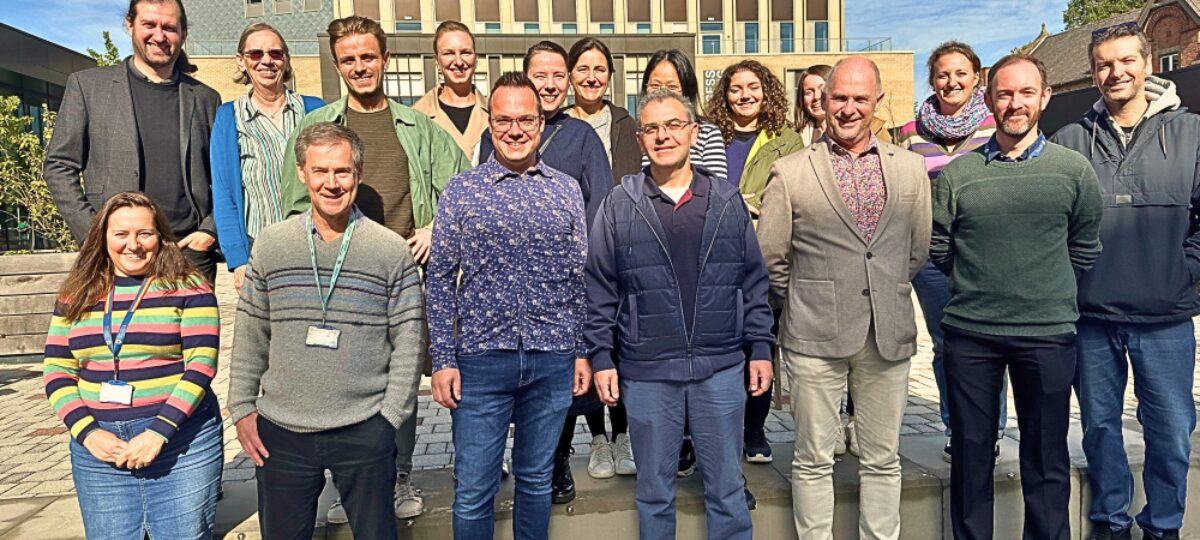Third Annual Meeting of the PRE-ACT Horizons Consortium
Wednesday, 16 October 2024
The third annual meeting of the PRE-ACT Horizons consortium took place from 11 to 13 September. The University of Leicester hosted it. Special thanks to Christopher Talbot and Vicki Emms for organizing the meeting. Three days of important brainstorming and discussions to make important decisions across all eight work packages. Over the next 3 years, the PRE-ACT consortium will predict the risk of radiotherapy side effects, including arm lymphedema in breast cancer patients, using explicable artificial intelligence (AI), resulting in a personalized app for both doctor and patient.
Data and data management
The databases (including a.o. imagery) of the three studies: Requite, Canto and HypoG-01 were brought together. The regulations in force in the countries regarding patient privacy, AVG and cybersecurity (e.g. servers) were met. The databases were compared, eliminating incompatible data and using software and processes (e.g. radiomics, dosiomics, DHV) to make incompatible data comparable. A complicated process that, thanks to the knowledge and expertise of Medical Data Works, was achieved. All in all, there is a robust basis from which an AI model can be made.
AI model
Over the past six months, Guido Bologna of Hes.so and others have been working to develop a reliable ML model that fits the brief and can work with the database. Several steps have been taken and a number of important decisions have been made during the meeting to make the algorithm even more reliable (decision trees, training sets, etc.). It will then be transformed by Thera into an AI-driven dose prediction model. At the same time, the AUEB-RC worked on a proof of concept for learning distribution using advanced federated learning techniques. During the meeting, it became clear that there is a need for supporting explanations to both doctors and patients about the system and the interpretation of the results. Clear communication is essential. Additional efforts in this area will be made to this in the coming period.
Clinical trial
An important next step in the process is the clinical trial. Its design has been prepared by Unicancer in consultation with Maastro and Leicester Cancer Research Centre. The aim remains to demonstrate that communicating a risk prediction for arm lymphedema using an explanatory AI is non-inferior to not communicating this risk prediction . The whole process has been designed over the last few months, including all hypotheses, randomisation rules, survey forms, dummy runs, legal aspects, etc. The study will be submitted for approval in France and then translated for the Netherlands and the UK. The clinical trial is the most exciting part of the coming period in terms of planning, duration, and results.
Communication with patients and doctors
Acceptance of the app is crucial to the success of the project and therefore communication with the target groups. In an initial phase, numerous focus group discussions were held, providing valuable information on functionality, design and user interface. In addition, reliability is the key word. It is also important to have a good understanding of what you are measuring and how relevant it is to patients and doctors. In essence, the result should be the same for the doctor and the patient and there should be no discussion about the method used and the advice based on the data. Over the coming months, Francesca Fracasso and her colleagues will continue to refine and refine this theme.
Ethical AI, health economics and project communication
Three other topics passed the review, all of which are 'ongoing'. In ethical AI, for example, a model is being developed to ensure that no crazy things can happen to the data, the AI and the results. In the area of health economics, Maastricht University is developing a model to measure the economic benefits of the app. Here, many criteria (direct and indirect) are important to prevent bad lymphedema in relation to the cost of treatment. Finally, there has been a focus on communicating the overall project and its progress, in particular through a dedicated website, newsletter and social media channels.
Patient interest
Throughout the project, patients' interests are of course taken into account. This is ensured by two patient representatives, Hillay Stobbart (UK) and Cheryl Roumen (NL), who are permanently involved in the process. They are actively involved in discussions, brainstorming and decision-making. They offer advice, solicited and unsolicited, to the members of the consortia. This will only improve the project and deliver an outcome that meets patients' expectations.
Update: Publications
Two posters were submitted for ASTRO 2024, 29 September - 2 October this year, by Karolien Verhoeven et al entitled: ‘Physicians’ views on Explainable Artificial Intelligence (XAI) models to predict the risk of toxicity following breast radiotherapy’ and “Multi-Institutional qualitative evaluation of automatic and manual segmentations of organs at risk on PRE ACT breast cancer cohorts”. Both can be read on this website.
